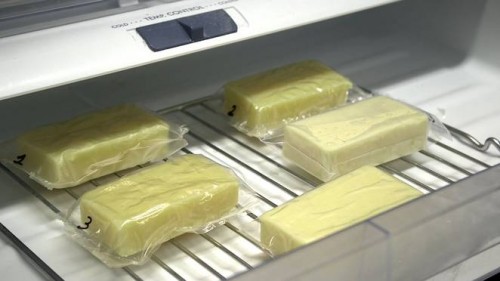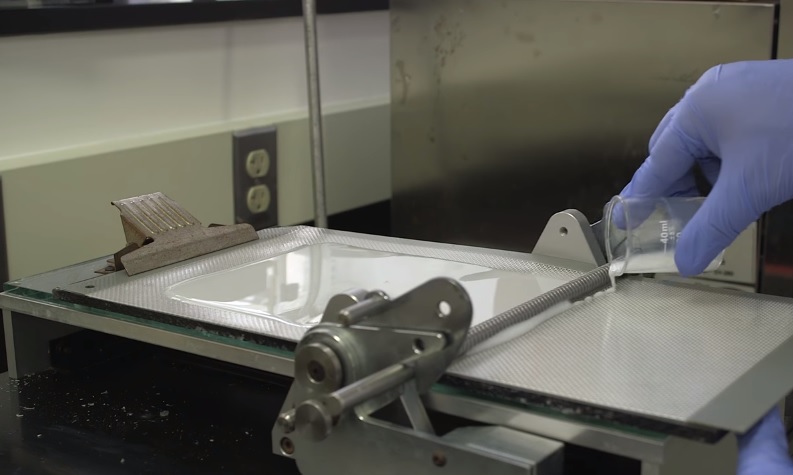RECOMMENDED VIDEOS

Eco Promotional Products Cork Mouse Pad
Eco Promotional Products, Inc.

https://www.youtube.com/watch?v=3jTJLwMK61Q
Arbos srl

D-TWELVE LAMP on Kickstarter
Plato Design Company

Softcare eco-friendly new products
Oy Soft Protector Ltd.

Homemade beauty products in UK (eco, organic & natural…
Eco-cosmetics4u
Related Stories
RepAir T-shirt cleans the air while you wear it
German city offers ingenious alternative to single-use coffee cups
These vegan “Star Wars” sneakers are made with discarded pineapple leaves
Loch sunglasses are made of 500-year-old timbers from the Great Lakes
Freitag Bags still going strong after 24 years
22 Aug, 2016

Milk-based film could be the next generation of sustainable food packaging
Eco Products & Services | UNITED STATES | 24 Aug, 2016
Published by : Eco Media Asia
This is great news, unless you're sensitive to casein, or are vehemently opposed to the dairy industry.
Thanks to the availability of cheaply produced plastics, we're rapidly contaminating every square inch on earth with this material, and while it's possible to ditch some, if not most, plastics from our lives through making careful choices, there are some places where stretchy transparent films are almost impossible to avoid, such as food packaging. And considering that reducing plastic packaging seems to be an ecological imperative if we ever want our future culture to get anywhere near sustainability, either we need to revamp our entire food system (which is a great goal, but also a monumental task), or we need to find better alternatives to these single-use plastic films.

Researchers at the US Department of Agriculture (USDA) may have found one solution, in the form of a milk-based film that has been shown to be up to 500 times better than conventional plastic films at keeping oxygen away from the foods wrapped in it, and "because they are derived from milk, are biodegradable, sustainable and edible." According to the American Chemical Society, this new casein-based film forms a tighter network (than other biodegradable films) when polymerized, which could lead to longer shelf life of the foods packaged in it, and in turn, to reduced food waste.
"The protein-based films are powerful oxygen blockers that help prevent food spoilage. When used in packaging, they could prevent food waste during distribution along the food chain." - Peggy Tomasula, D.Sc., leader of research team
The researchers developed an earlier version of the film using pure casein, but found that it was "relatively hard to handle" and dissolved in water too quickly. The addition of citrus pectin to the casein, along with some other improvements, led to a stronger material that was also less susceptible to humidity and high temperatures. The press release says that although the material is edible, the casein-based film "does not have much taste," but that other additives such as vitamins, flavorings, probiotics, and other ingredients could be incorporated into it in the future.
The new film could also be applied as a spray to the inner linings of other packaging materials, such as pizza or cereal boxes, to replace the recently banned perfluorinated coatings, in order to serve as a safer, as well as biodegradable, alternative.
"The coatings applications for this product are endless. We are currently testing applications such as single-serve, edible food wrappers. For instance, individually wrapped cheese sticks use a large proportion of plastic — we would like to fix that." - Laetitia Bonnaillie, Ph.D., co-leader of the study
Another potential use for the new material could be as an edible coating for certain foods, such as cereals, which often have a sugar coating on them to keep them from getting soggy right away in milk, and the casein-based coating would have an added benefit of effectively reducing the sugar content in these foods.
The USDA research group working on this new casein-based film is said to be creating prototype samples of the material for at least one interested company, and plans to keep improving on the film, which could be in commercial use as soon as three years from now.
An article by Derek Markham at treehugger.com
Read more interesting articles at treehugger.com
Read more interesting articles at treehugger.com
